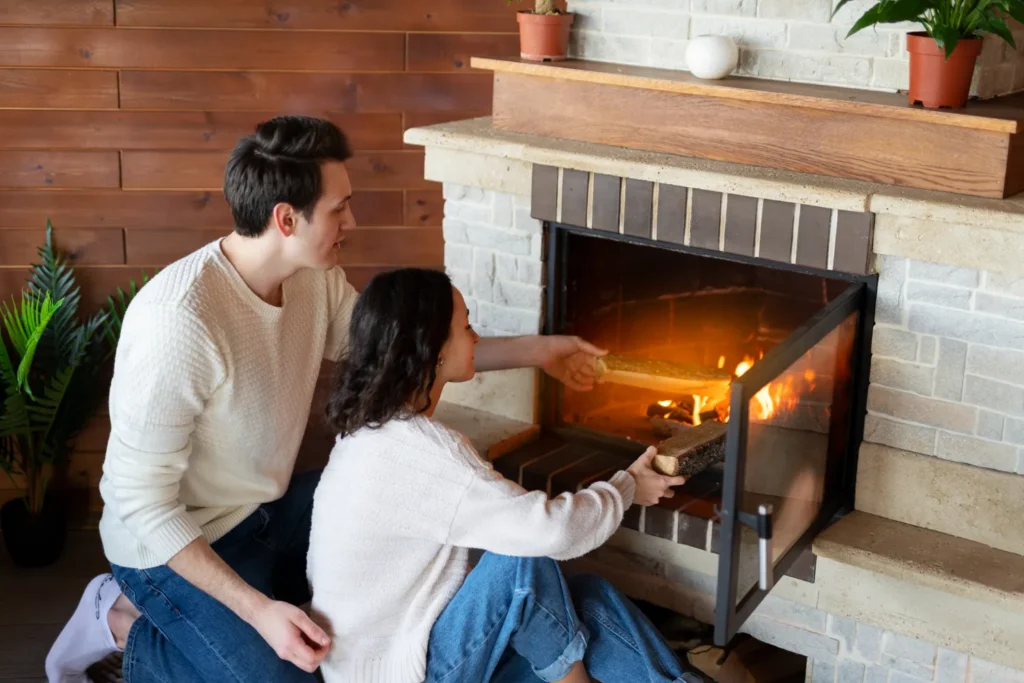Are you constantly adjusting your thermostat but still can’t seem to get comfortable? It might be time to ask yourself, “When to replace furnace?” At 75 Degree AC, we’re here to guide you through this crucial decision. Understanding the lifespan of your furnace and recognizing the signs of inefficiency are vital to maintaining a warm and cozy home in Houston.
Whether it’s a simple repair or a complete replacement, we’ll help you navigate the options so you can make an informed choice. Stay tuned as we explore the ins and outs of furnace maintenance and replacement, ensuring your home’s heating is always up to par.
Table of Contents
5 Key Signs When To Replace Furnace

1. Replace Your Furnace as It Approaches The End of Its Life Expectancy.
The lifespan of a furnace is akin to the lifespan of a beloved pet – it’s finite and marked by stages of decline. Most furnaces have an average lifespan ranging from 15 to 30 years, contingent upon factors like maintenance, usage patterns, and technological advancements.
As your furnace tiptoes towards the upper echelons of its lifespan, it’s akin to walking on thin ice; at any moment, it could crack under pressure. Even if your furnace seems to be soldiering on, its efficiency diminishes with age, leading to higher energy bills and an increased risk of breakdowns.
Thus, replacing your furnace as it nears the twilight of its lifespan is a prudent move to ensure uninterrupted warmth and efficiency.
2. Replace (or repair) Your Furnace When Unusual Noises Are a Sign of Failure.
Imagine your furnace as a maestro orchestrating a symphony of warmth; any discordant notes are cause for concern. Unusual noises emanating from your furnace, be it clanking, rattling, or groaning, aren’t merely annoying; they’re harbingers of impending doom.
These auditory distress signals often signify underlying issues like a failing motor, loose components, or worn-out bearings. Turning a deaf ear to these warning signs might lead to catastrophic failures when you least expect them. Therefore, promptly addressing unusual noises through repair or replacement ensures the smooth operation of your heating system.
Also Read: Top Common Reasons Why Your Houston Air Conditioner is Making Weird Noises
3. Replace Your Furnace If Your Building is Experiencing Poor Air Quality.
Your furnace isn’t just a heat-producing marvel; it’s also a guardian of indoor air quality. If your home resembles a dust-filled cavern or if occupants experience persistent respiratory issues, your furnace might be the culprit. Aging furnace’s often struggle to filter and distribute air effectively, leading to a decline in indoor air quality.
Breathing clean air is paramount for a healthy home environment. If your furnace jeopardizes this, it’s time for an upgrade. A new furnace not only ensures optimal heating but also enhances indoor air quality, promoting the well-being of your household.
4. Replace Your Furnace If it is Operating More Frequently.
A well-functioning furnace operates akin to a seasoned marathon runner – steady, efficient, and strategic. However, suppose your furnace decides to sprint instead of jogging, operating incessantly, or cycling too frequently. In that case, it’s a sign of trouble brewing.
This erratic behavior not only strains the system but also leads to inflated energy bills. A newer, more energy-efficient furnace is akin to switching from a gas-guzzling SUV to a sleek hybrid; it offers superior performance while conserving resources. Upgrading your furnace ensures optimal heating without the constant whirring and humming of an overworked system.
5. Replace Your Furnace If Maintenance Costs Are Growing.
Regular maintenance is essential for any mechanical system, but when the costs seem endless, it’s time to reconsider. Older furnaces, like vintage cars, become more temperamental with age, needing frequent repairs and adjustments. The total cost of these interventions often exceeds the investment in a new furnace, making it a financially wise choice. Upgrading to a newer model not only gives peace of mind but also removes the ongoing expenses tied to maintaining an aging furnace.
Should You Replace a Furnace Before it Breaks?
The conundrum of whether to replace a furnace before its inevitable breakdown is a pivotal decision that often juggles practicality, financial considerations, and the looming uncertainty of unforeseen emergencies.
Let’s delve into the two sides of this quandary – the merits of replacing it before it breaks and the rationale for holding off until the eleventh hour.
Why You Should Replace It Before it Breaks
Avoid Emergency Situations:
The prospect of waking up on a frigid winter morning only to find your furnace on strike is a chilling thought. Replacing your furnace before it succumbs to a sudden breakdown eliminates the risk of finding yourself in an emergency heating crisis. The proactive approach ensures that you are in control of when and how you transition to a new, reliable heating systems.
Increased Energy Efficiency:
Newer furnace models come armed with cutting-edge technology designed to maximize energy efficiency. Upgrading before a breakdown ensures you can benefit from these advancements sooner, translating into long-term savings on energy bills. It’s not just about averting a crisis; it’s about ushering in a more energy-efficient era for your home.
Cost Savings in the Long Run:
Getting a new furnace is a big upfront expense. However, the long-term savings in energy bills and maintenance costs usually make up for it. Choosing to replace your furnace proactively is a strategic financial move, swapping potential emergency repair costs for a planned investment in a more efficient heating systems.
Why You Shouldn’t Replace It Before It Breaks
Financial Considerations:
When it comes to household budgeting, practicality sometimes conflicts with the idea of proactive upgrades. If your current furnaces is still working fine and the cost of a replacement is too high, waiting until it breaks might be the smarter choice. This lets you get the most out of your current system until you can afford a new one.
Unexpected Life Extension:
Furnaces, like resilient survivors, can sometimes outlast their expected lifespan and keep working well. If your furnace is performing strongly, replacing it too soon might feel like trading in a reliable car before it hits a mileage milestone. In such situations, it’s crucial to assess your furnace health and efficiency carefully.
Deciding whether to replace your furnace before it breaks down requires a delicate balance between foresight and your current financial situation. Whether you opt for proactive replacement or a more cautious wait-and-see approach, understanding the reasons behind each option ensures a well-informed decision that fits your household’s specific circumstances.
How Long Does a Furnace Last?

Thinking about your furnace lifespan is essential for home maintenance, financial planning, and overall comfort. Knowing how long a furnace usually lasts helps homeowners predict when their heating systems might be nearing the end. Let’s explore the timeline of furnaces together. On average, a furnace can endure anywhere from 15 to 30 years. However, this lifespan is not etched in stone but is influenced by various factors.
How Much Does a New Furnace Replacement Cost in 2024?
Embarking on the journey of replacing your furnace in 2024 means being open to change and having a clear understanding of the financial aspects. Let’s dig into the details of the replacement costs associated with getting a new furnace this year.
The price of a new furnace in 2024 depends on various factors, such as the type of furnace, brand, where you live, and specific features. With ongoing advancements in HVAC technology, newer models often have advanced features that enhance their efficiency and performance.
Here’s a breakdown to give you an idea of the potential investment:
Basic Furnace Models:
On the more economical end of the spectrum, basic furnace models can start from around $2,500. These models typically provide reliable heating without the frills of advanced features, making them a budget-friendly option.
Mid-Range Furnace Models:
For those seeking a balance between cost and advanced features, mid-range furnace models range between $3,500 and $5,500. These furnaces often come with improved energy efficiency, better performance, and added technological enhancements.
High-Efficiency or Premium Models:
Investing in high-efficiency or premium models equipped with the latest technological marvels can push the cost to the higher end of the spectrum, reaching up to $7,500 or more. These furnaces boast superior energy efficiency, enhanced comfort features, and a longer lifespan.
It’s crucial to note that these figures encompass not only the cost of the furnace itself but also the installation charges. Installation costs can vary based on factors like the complexity of the furnace installation process, the need for additional ductwork, and the geographical location of your residence.
To navigate this financial terrain wisely, obtaining multiple quotes from reputable hvac companies / contractor is essential. This allows you to make an informed decision based on your specific needs, budget, and the unique requirements of your home.
FAQ More About When To Replace Furnace
How Do You Know When to Replace a Furnace?
Deciphering the runes, indicating furnace replacements, involves a Sherlock Holmes-esque inspection. Keep tabs on signs of aging, strange furnace noises, declining air quality, frequent cycling, and soaring maintenance costs. Proactive replacement isn’t just about avoiding breakdowns; it’s a savvy move to maximize energy efficiency.
Is a 20-Year-Old Furnace Too Old?
While some well-preserved furnaces might defy Father Time, the 20-year mark is generally considered the threshold; as your furnace approaches this milestone, scrutinize it for signs of decline. If efficiency and reliability wane, the scales tip toward replacement.
At What Age Should a Furnace Be Replaced?
Furnaces typically dance on this mortal coil for 15 to 30 years. As a general guideline, when your furnace treads into the twilight of this range and signs of decay emerge, replacement should be a front-and-center consideration.
Can Furnaces Last 30 Years?
With meticulous care and moderate usage, some furnaces do manage to age gracefully, surpassing the 30-year mark. However, as time waltzes on, efficiency dips, leading to higher energy bills. Regular check-ups become paramount to ensuring the continued reliability of these seasoned heating companions.
Should I Replace a 27-Year-Old Furnace?
A 27-year-old furnace has weathered its fair share of seasons. If you detect signs of wear and tear, like escalating maintenance costs or reduced efficiency, consider it a nudge from the universe to explore the world of newer, more efficient furnaces.
Should I Replace a 28-Year-Old Furnace?
At 28, your furnace might be eyeing retirement. While it’s commendable that it has soldiered on, proactive replacement is advised. It’s not just about avoiding sudden breakdowns; it’s about embracing the efficiency and technological advancements offered by contemporary furnaces.
How can I tell if my current furnace needs repair or replacement?
If your furnace is struggling to provide consistent heat, making unusual noises, or resulting in higher energy bills, it may be time for a repair or replacement. Regular maintenance can extend the life of your furnace, but if it’s over 15 years old and frequently needs repairs, replacing it might be more cost-effective.
What are the signs that my furnace is not producing enough heat?
If you notice cold spots in your home, increased energy bills, or if your furnace is constantly running without adequately heating your space, it might be a sign that your furnace is not producing enough heat. It could be due to a variety of issues, including dirty filters, a malfunctioning thermostat, or a more severe problem with the furnace itself.
Is it better to furnace repair or replace my furnace?
The decision to repair or replace your furnace depends on several factors to decide When to replace furnace or when to repair furnace, including the age of your furnace, the cost of repairs, and the efficiency of your current system. If your furnace is relatively new and the repair is minor, it might be more cost-effective to repair it. However, if your furnace is old and the repairs are expensive, replacing it with a more energy-efficient model might be a better long-term investment.
What should I consider when replacing my furnace?
When replacing your furnace, consider factors such as the size of your home, the climate in your area, the energy efficiency of the new furnace, and your budget. It’s also essential to choose a reputable HVAC contractor for the installation to ensure that your new furnace is installed correctly and operates efficiently.
How often should I schedule heating repair and maintenance?
It’s recommended that you schedule annual maintenance for your heating system to ensure it’s operating efficiently and to prevent potential issues. Regular maintenance can extend the life of your furnace and prevent costly repairs. If you notice any problems with your heating system, it’s best to schedule a repair as soon as possible to avoid further damage.
Conclusion – When To Replace Furnace
In conclusion, understanding When to replace furnace is crucial for maintaining a comfortable and energy-efficient home. Regular maintenance and being attentive to signs of inefficiency or wear can extend the life of your current furnace.
However, if you’re facing frequent repairs or your furnace is outdated, investing in a new, energy-efficient model may be more cost-effective in the long run. At 75 Degree AC, we’re dedicated to providing expert furnace repair and replacement services to ensure your home stays warm and cozy. Contact us for professional advice and solutions tailored to your heating needs.
